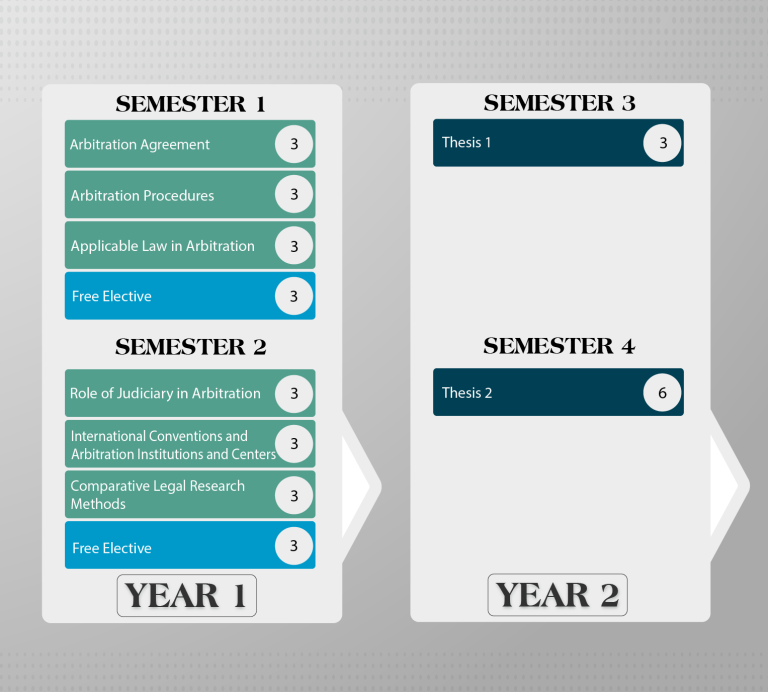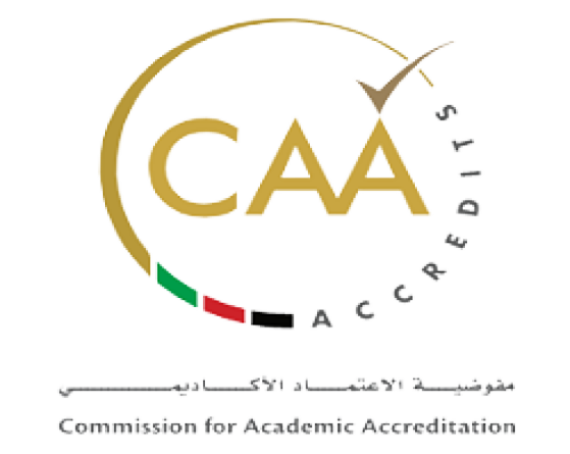Master In Arbitration
This program was created in response to the needs of the job market, where arbitration has become an increasingly popular means of settling disputes. It should be noted that students lacking a Bachelor’s degree in Law can still be admitted to this program, as well as regular Law graduates. Students coming from fields such as Contracting and Engineering are especially encouraged to apply.
This program qualifies graduates to work in the following fields/careers:
- Arbitration
- The Judiciary
- Law
- International Arbitration
- Corporate Legal Advisory
Program Goals
- Meeting needs of the local and regional market for experts and specialists in the various fields of Arbitration.
- Developing the scientific research in the field of Arbitration in accordance with the legal rules valid in UAE through supporting the Master’s theses, and emphasizing on comparative analytical studies.
- Establishing a legal center specialized in Gulf legal studies in the field of Arbitration to contribute to preparation of Master’s students in this field.
- Supporting the field of Arbitration and making the academic program as the axis of the Arbitration development in UAE and GCC countries through providing consultations, holding academic and occupational conferences for the stakeholders within the social service framework.
- Explain the knowledge of arbitration in an in-depth and comprehensive manner.
- Analyze contemporary knowledge and understand the recent developments in arbitration, professional practice and knowledge production to find new concepts and innovative solutions to emerging challenges.
- Write scientific research in the field of arbitration in line with legal research methods and the requirements of scientific integrity.
- Apply the acquired skills in the field of adjudicating disputes through arbitration, by developing the student’s research and practical skills which demonstrate their ability to think and analyze with a high degree of independence.
- Present the ability to carry out legal duties objectively, impartially and independently through self-learning and interactive applications.
- Compare the various doctrinal and legislative trends in arbitration issues.
- Lead the work team to solve relevant legal problems in the field of arbitration, dispute resolution and taking responsibility.
ADMISSION REQUIREMENTS
GRADUATION REQUIREMENTS
For graduate degree completion, graduate students must satisfy the following requirements:
- Earn a minimum CGPA of 3.00 on a scale of 4.00.
- Successfully complete all courses as described in the study plan.
- The Degree Completion requirements must be met within the timeframe of the program.
- Successfully complete the “Thesis” course.
ACCREDITATION
PROGRAM STRUCTURE
Course Category
Total Number of Courses
Total Number of Credit Hours
Bridging Courses
7
19
Core Courses
6
18
Free Electives
2
6
Thesis 1
1
3
Thesis 2
1
6
Total (Excluding Bridging Courses)
33 Credit Hours
PROGRAM courses
BRIDGING COURSES
7 COURSES | 19 CREDIT HOURS
This course includes a study of the international foreign private relationships, the issue of legal and international jurisdiction conflicts, the adaptation of disputes, and methods for resolving them using the Federal Civil Transactions Law’s attribution principles. The course also covers determining the boundaries of international jurisdiction for federal courts.
This course covers the history of companies in commercial law, including their establishment, management, classification, and expiration, as well as the specifics of their provisions regarding limited partnerships, general partnerships, limited shares, public and private shareholding companies, and the explanation of their provisions under commercial banking law.
The course introduces the students to the foundations and methods of research and helps them how to choose a topic for research by addressing an existing legal problem and solving it.
Also, the course teaches the students how to develop solutions for legal problems through research and help them understand sources and tools for collecting scientific data, principles of legal writing, how to document the information and attribute it to its source and the rules of comparison between the current legal systems (Islamic law, Latin system and Anglo-American system).
Moreover, the students will learn how to discuss jurisprudential opinions and legal theories and weigh between them, as well as introducing a new opinion that enriches the researcher’s legal library. The course also covers the ethics of scientific research and oral expression skills related to the presentation of the research and its findings.
The student is assigned to prepare a legal research using the approved research methods and then present it to his colleagues.
CORE COURSES
6 COURSES | 18 CREDIT HOURS
The course aims to provide the students with an in-depth knowledge about the judiciary and arbitration, as well as introducing them to the nature of the relationship between the judiciary and arbitration and the difference between the judiciary as a general mean and arbitration as a parallel mean for settling disputes.
The course also helps the students understand the extent to which the arbitration depends on the judiciary in arbitration agreements, arbitration procedures, implementation of arbitral award, and formation of arbitral tribunal.
The course introduces the students to national and international agreements related to arbitration, including the Geneva Convention on the Execution of Foreign Arbitral Awards, the Washington Convention that led to the establishment of the International Centre for Settlement of Investment Disputes, the Oman Convention on International Commercial Arbitration and the Arab Convention on Commercial Arbitration.
Also, the students will learn about the most important arbitration centers that make decisions on various disputes and their rules, including the Washington Center for Settlement of Investment Disputes, International Chamber of Commerce, the Cairo Regional Centre for International Commercial Arbitration, the Dubai International Arbitration Centre, and the G.C.C Commercial Arbitration Centre
ELECTIVE COURSES
2 COURSES | 6 CREDIT HOURS
THESIS
2 COURSES | 9 CREDIT HOURS
Students in this course will work with their thesis supervisor to develop a thesis proposal and begin their distinctive, applied research project. The primary goal is for the student to practice the mechanisms of transitioning from concept to active inquiry. Depending on the nature of the topic, the student will develop a study questions, conduct a literature review, develop a methodological approach, and begin preliminary research. Students are expected to apply qualitative, quantitative, and comparative research approaches to the chosen topic.
In this course, students will continue developing their thesis project, revising techniques (if required), addressing challenges, analyzing findings, and eventually articulating the complete experience. Students will build on work from the previous semester and put all of the pieces together to complete the final thesis project, following the required research process and procedures. Students will be required to provide a verbal defense as part of the assessment and fulfilment of the course.
RECOMMENDED STUDY PLAN

ATTENDANCE
Weekday Classes
Sat – Sun | From 9:00 am – 12:00 pm
Sat – Sun | From 2:00 pm – 5:00 pm
Weekday Classes
Tue – Thur | From 5:00 pm – 8:00 pm
Mon – Wed | From 5:00 pm – 8:00 pm



